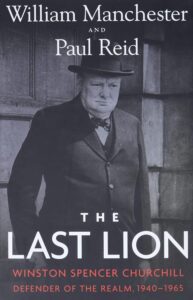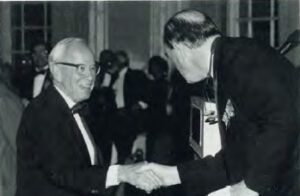
Manchester and Reid: “The Last Lion: Defender of the Realm”
William Manchester and Paul Reid: The Last Lion: Winston Spencer Churchill, vol. 3, Defender of the Realm, 1940-1965. New York: Little Brown, 2012, 1184 pages. (Updated from 2012.)
Macaulay wrote in Lays of Ancient Rome: “Then out spake brave Horatius, the Captain of the Gate.” That was William Manchester’s kind inscription on my volume 2 of The Last Lion. It reminds me that Bill was himself for many of us “Captain of the Gate.” His death in 2004 bid fair to deprive us of finale of the most lyrical Churchill book ever written. Would the story end with his second volume, on the brink of 1940? Not quite. Twenty-four years on, Little Brown published the third and final volume.
 The first two volumes of The Last Lion were the most celebrated Churchill works of their time. More than twenty years in the writing, Volume 3 was completed by his friend Paul Reid. It was a faithful portrait, positive but not without criticism. Reid was particularly revealing on Churchill’s thinking about the Second Front and Allied strategy in the Second World War.
The first two volumes of The Last Lion were the most celebrated Churchill works of their time. More than twenty years in the writing, Volume 3 was completed by his friend Paul Reid. It was a faithful portrait, positive but not without criticism. Reid was particularly revealing on Churchill’s thinking about the Second Front and Allied strategy in the Second World War.
On a personal level, too, Reid was sound, correctly portraying Churchill as enjoying alcohol but no alcoholic, no megalomaniac, no victim of the overblown “Black Dog.” Last Lion 3 correctly evaluated WSC’s mental state. As Jim Miller wrote in The New York Times Magazine:
After studying Mayo Clinic mental-health protocols and consulting other experts about Churchill’s probable state of mind, Reid came to a conclusion at odds with Manchester’s opinion that Churchill suffered from mental illness. He just lived in stressful and depressing times. “I don’t know why Manchester imparted that dark side to Churchill,” he says. “Every writer puts some of himself into his story. My take on the issue of depression is vastly different than Bill’s was.”
Beyond his brief
Paul Reid also did something William Manchester never intended. He extended the book beyond 1945, to a period Bill told me was superfluous. He insisted all that was a mere coda to the epic of the Second World War. Paul pondered this and decided to take the story to its end. He provided a little (though not a lot) on Churchill’s scintillating performance as leader of the opposition (1945-51), his second premiership (1951-55), and his noble, fruitless quest for a permanent peace. Frankly, those later years were better covered by Andrew Roberts’ equally seminal biography, Churchill: Walking With Destiny (2018).
Churchill himself said: “Nothing surpasses 1940.” Last Lion 3 begins there, just after he became prime minister. Britain and its Commonwealth stood alone against the might of undefeated Germany. The Churchill conjured up by Reid is a man of indomitable courage, compelling intellect and irresistible will. He explains how the Prime Minister organized Britain’s defense and worked “to drag America into the war.”
Here is the “never surrender” ethos that helped earn the victory. Here too is the rapid shift of world power to America and Russia. “I have not become the King’s first minister in order to preside over the liquidation of the British Empire,” he said. He did not; others did that. Yet he saw the end coming quite early, and towards the end he was resigned to it—not without a proud nostalgia.
Manchester and Reid

William Manchester was a hugely successful popular writer with a unique, inspiring style. His books include his memoir of the Pacific War, Goodbye Darkness (his personal favorite); A World Lit Only by Fire; The Glory and the Dream; The Arms of Krupp; American Caesar; and The Death of a President.
His description of climacterics in these books are classics. Recall his telling of MacArthur’s valedictory address at West Point. Or Churchill during the Fall of France: “Another bloody country gone west.” Or Lee Harvey Oswald with his gun in the schoolbook depository at Dallas: “Ready on the right, ready on the left; all ready on the firing line.” Manchester’s passages will be recalled as long as English is spoken.
Paul Reid of North Carolina, a longtime feature writer for the Palm Beach Post, was an award-winning journalist. What matters too is that he was Manchester’s friend. In 1998, in the midst of research for Volume 3, Bill suffered two strokes that left him with mental faculties but unable to write. In October 2003, he asked Paul to complete the volume, saying: “I wanted a writer, not a historian.” It was an informal conversation, Paul Reid recalls, “sealed with a handshake.” In April 2004, two months before Bill’s death, they signed a formal agreement.
A great work
Paul Reid completed the research and transformed more than forty tablets of Manchester’s notes—“clumps” as he called them—to produce Last Lion 3. With others, I had the joy to be called on to vet his manuscript, as I had Bill’s Last Lion 2. The reviews assured Paul of a variety of opinions and reduced the chance of minor errors of fact that crept into the previous volumes. (I found quite a few in volume 2 and not all of them were fixed.) Manchester fans will find much of Bill’s trademark pace and cadence in this last installment of a classic. Last Lion is a mesmerizing journey through what Lady Soames called “The Saga.”
In a flourish suitable to a great work, Paul Reid ends his story on January 30th, 1965 with the best words Lord Moran ever wrote:
The village stations on the way to Bladon were crowded with his countrymen, and at Bladon in a country churchyard, in the stillness of a winter evening, in the presence of his family and a few friends, Winston Churchill was committed to English earth, which in his finest hour he had held inviolate.
Bill Manchester would like that.







2 thoughts on “Manchester and Reid: “The Last Lion: Defender of the Realm””
Despite all the flak that Moran took for his ‘diaries’, I have always considered those atmospheric words of his to be the second most beautiful tribute to the old boy that I’ve ever read. First place goes, of course, to Mary Soames, quoted by Martin Gilbert to close the official biography. “In addition to all the feelings a daughter has for a loving, generous father, I owe you what every Englishman, woman & child does – Liberty itself.”
Richard, Splendid stuff. You have entered my commonplace book with the quotation of the day–you quoting Reid, Reid quoting Lord Moran, me quoting you. With your help and the Churchill conferences, I have all three volumes of The Last Lioin signed and happily sharing space with your fine books in the Churchill room of my home library.
Comments are closed.